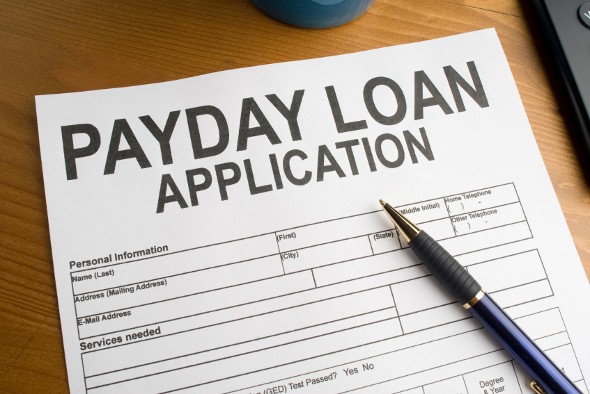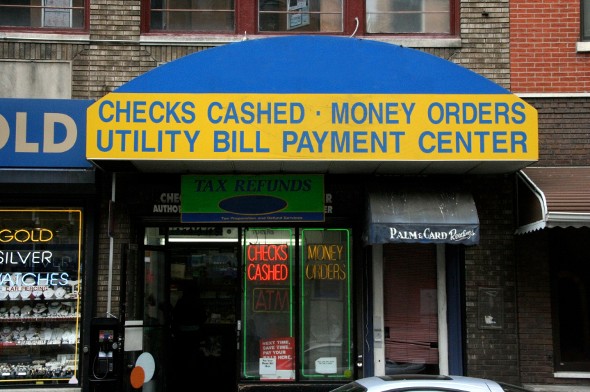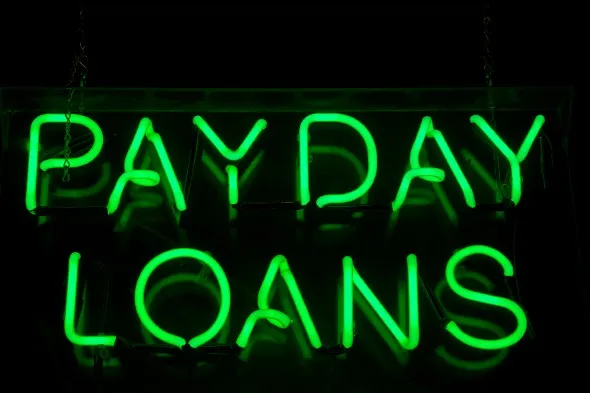Many Americans have income that fluctuates from week to week. When incomes are unsteady, any unexpected expense can leave you coming up short. If you don’t have a fully funded emergency fund, you may find yourself looking around for loans to bridge the gap and get you to your next paycheck. Payday loans are out there, but at a high cost to borrowers. Before taking out a payday loan you may want to first make a budget. You can work with a financial advisor who can help you make a long-term financial plan that you can budget your finances to meet.
Payday Loans: Short-Term Loans with a High Price

What are payday loans? Say you’re still 12 days away from your next paycheck but you need $400 for emergency car repairs. Without the $400 your car won’t run, you won’t make it to work, you’ll lose your job and possibly lose your housing too. High stakes.
If you go to a payday lender, they’ll ask you to write a future-dated check for an amount equal to $400 plus a financing fee. In exchange, you’ll get $400. You’ll generally have two weeks or until your next paycheck to pay that money back. Say the financing fee is $40. You’ve paid $40 to borrow $400 for two weeks.
If you pay back the money within the loan term, you’re out $40 but you’re not responsible for paying interest. But the thing is, many people can’t pay back their loans. When that happens, the money they borrowed is subject to double-digit, triple-digit or even quadruple-digit interest rates. It’s easy to see how a payday loan can lead to a debt spiral. That’s why payday loans are illegal in some places and their interest rates are regulated in others.
When your loan term ends, you can ask your payday loan lender to cash the check you wrote when you agreed to the loan. Or, you can roll that debt into a new debt, paying a new set of financing fees in the process. Rolling over debt is what leads to a debt spiral, but it’s often people’s only choice if they don’t have enough money in their account to cover the check they wrote.
Are Payday Loans a Good Idea?
Not all debt is created equal. An affordable mortgage on a home that’s rising in value is different from a private student loan with a high-interest rate that you’re struggling to pay off. With payday loans, you pay a lot of money for the privilege of taking out a small short-term loan. Payday loans can easily get out of control, leading borrowers deeper and deeper into debt.
And with their high-interest rates, payday loans put borrowers in the position of making interest-only payments, never able to chip away at the principal they borrowed or get out of debt for good.
Payday Loans and Your Credit
 Payday loans don’t require a credit check. If you pay back your payday loan on time, that loan generally won’t show up on your credit reports with any of the three credit reporting agencies (Experian, TransUnion and Equifax). Paying back a payday loan within your loan term won’t boost your credit score or help you build credit.
Payday loans don’t require a credit check. If you pay back your payday loan on time, that loan generally won’t show up on your credit reports with any of the three credit reporting agencies (Experian, TransUnion and Equifax). Paying back a payday loan within your loan term won’t boost your credit score or help you build credit.
But what about if you’re unable to repay your payday loan? Will that payday loan hurt your credit? It could. If your payday lender sells your debt to a collection agency, that debt collector could report your unpaid loan to the credit reporting agencies. It would then appear as a negative entry on your credit report and lower your credit score. Remember that it takes seven years for negative entries to cycle off your credit report.
Having a debt that goes to collections is not just a blow to your credit score. It can put you on the radar of some unsavory characters. In some cases, debt collectors may threaten to press charges. Because borrowers write a check when they take out a payday loan, debt collectors may try to press charges using laws designed to punish those who commit fraud by writing checks for accounts with non-sufficient funds (these are known as NSF checks).
However, future-dated checks written to payday lenders are generally exempt from these laws. Debt collectors may threaten to bring charges as a way to get people to pay up, even though judges generally would dismiss any such charges.
Alternatives to Payday Loans
If you’re having a liquidity crisis but you want to avoid payday lenders, there are alternatives to consider. You could borrow from friends or family. You could seek a small personal loan from a bank, credit union or online peer-to-peer lending site.
Many sites now offer instant or same-day loans that rival the speed of payday lenders, but with lower fees and lower interest rates. You could also ask for an extension from your creditors, or for an advance from your employers.
Even forms of lending we don’t generally love, like credit card cash advances, tend to have lower interest rates than payday loans do. In short, it’s usually a good idea to avoid payday loans if you can. Instead, consider working on a budget that can help you get to your next paycheck with some breathing room, and make sure you have a rainy day fund.
The Bottom Line
When considering a short-term loan, it’s important to not just look for low-interest rates. Between fees and insurance policies, lenders sometimes find ways to bump effective interest rates to triple-digit levels even if they cap their APRs. The risks of taking a payday loan bring home the importance of working hard to build up an emergency fund that you can draw on.
Tips for Retirement Planning
- If you’re not already preparing for retirement then it’s a good idea to create a retirement plan and make sure you’re contributing to it regularly. If you’re overwhelmed or don’t know where to begin, a financial advisor can help you map it all out. Finding a financial advisor doesn’t have to be hard. SmartAsset’s free tool matches you with up to three vetted financial advisors who serve your area, and you can interview your advisor matches at no cost to decide which one is right for you. If you’re ready to find an advisor who can help you achieve your financial goals, get started now.
- Not sure how much you need to save for retirement? Consider using our free retirement calculator to get the number you need so that you can start making the right progress.
Photo credit: ©iStock.com/PeskyMonkey, ©iStock.com/Kirby Hamilton, ©iStock.com/Joe_Potato
